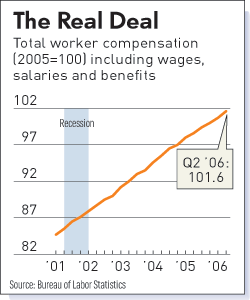Posted 8/28/2006
Economy: It's that time of year — Labor Day — when union-backed think tanks issue reports about how miserable U.S. workers are and when the think tanks' toadies in the liberal media come up with a few of their own.
And sure enough, there was The New York Times on Monday with its Page One contribution. Under the headline "Real Wages Fail to Match A Rise In Productivity," the paper makes its best case for why U.S. workers are worse off today than they were three years ago and have done worse in this economic recovery than in any recovery since World War II.
Specifically, it notes that the median hourly wage, adjusted for inflation, has slipped 2% since 2003, and that wages and salaries, as a share of GDP, are the lowest they've been since 1947.
There are all kinds of problems, however, with such a narrow analysis. Most of us aren't paid just in "wages" but in wages and benefits. And when the two are put together, total compensation is up 8.7% since 2003, for an average annual gain of 3.5%.

Why is this? Wages may not be soaring (up just 0.7% since 2000), but benefits are (13.1%). In other words, we're making more but getting it in the form of tax-free benefits. The Times' implication — that we are somehow falling behind in the Bush years — is simply not true.
If you want to know how we're really doing, look at what we spend and the wealth we're building. Here, too, you get a radically different picture. Consumer spending in the second quarter hit $8.053 trillion, up $659 billion, or roughly 4.2% a year, since 2003. How can we spend so much more if we have less?
Yes, we've been putting more on credit cards. But we've been doing that for 40 years.
A better answer is that we're wealthier. We now own about $53.8 trillion in stocks, cash and real estate — up a whopping 35% just since 2002. That "wealth effect" fuels spending.
Another problem with the newspaper's report is that it ignores the surge in illegal immigrants whose low wages skew the overall figures sharply downward. You simply can't import tens of millions of people willing to work for nothing and not expect to see an impact on overall wage levels.
Of course, the real point of the story in the anti-Bush Times is found in the subhead about laggard real wages: "Political Fallout Is Seen." But as long as the economy remains on the roll it's been on since Bush cut taxes, you can put that down as wishful thinking.
No comments:
Post a Comment